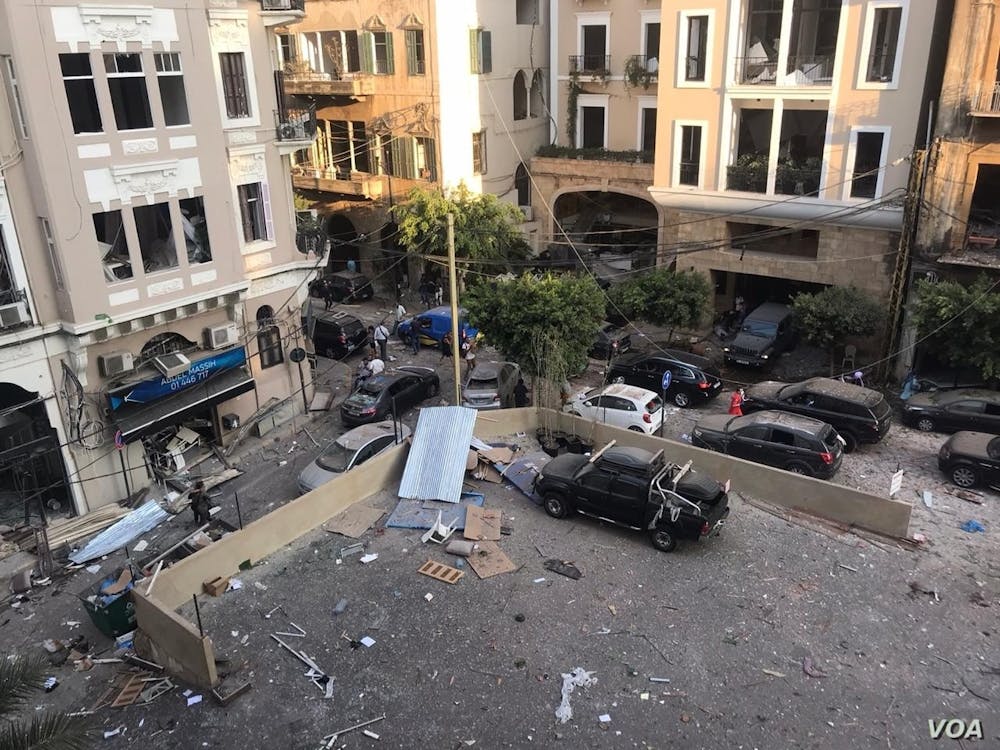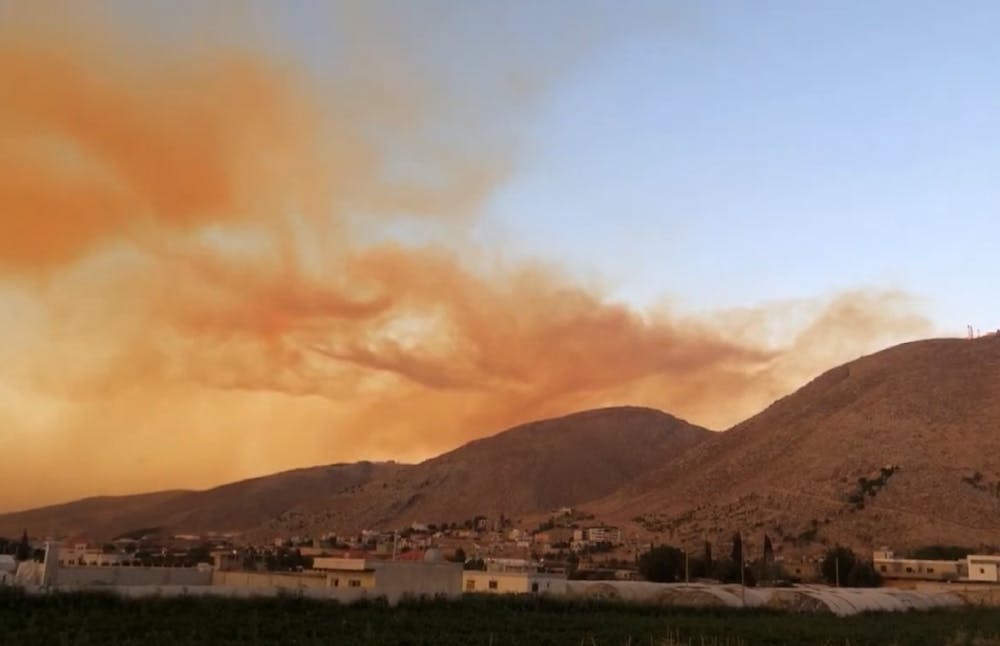
The aftermath of the Beirut port explosion on Aug. 4. (Photo by Anchal Vohra)
When Covid-19 forced Penn students to go home and take their classes online, it was an extremely disruptive hindrance to our education and to life as we knew it. But in Lebanon, students had been sent home long before the pandemic began. Far away, in this tiny country, students have been out of the classroom for the majority of the year due to months of protests that blocked the roads. Now their classrooms were just blown up and it can be attributed to the same corruption the people had been protesting against.
In the last year, between corrupt politicians, hyperinflation, famine, and a pandemic, Lebanon has fallen to its knees. Just when things looked like they couldn’t get any worse, another bomb dropped, almost quite literally. On the evening of August 4th, an explosion in Beirut’s port rocked the nation, ripping through buildings, homes, hospitals, and the people inside them. The explosion, felt over 150 miles away, blasted seismic waves equivalent to a magnitude 3.3 earthquake. The devastation left 300,000 people homeless, over 5,000 wounded, and 137 dead, with dozens more unaccounted for or trapped under the rubble as we speak.
In a heart-wrenching conversation with Iman Ezzeddine, a rising College freshman, she recounted witnessing the explosion from her living room in Beirut. “I was on the phone, not focused at all,” she said. “Then the house started shaking.” By the time she realized something was wrong, every window in the room had shattered, and the glass had flown towards her. At the hospital, doctors first thought the bump on her head could be a brain injury, but thankfully all Iman ended up needing was ten stitches. “I’m shocked that my family made it out alive,” Iman said. And it’s true — she was one of the lucky ones.
Fortunately, we don't know of any other members of the Penn community who were injured by the explosion. However, the homes of two other Penn students in Beirut, Maher Abdel Samad, rising Wharton and Engineering senior, and Laila Shadid, rising College sophomore, were severely damaged. Luckily, neither Maher nor Laila’s family members were injured.

These Penn students did not just suffer physical damages. The explosion has taken a huge emotional toll on the entire Lebanese community at Penn, because Lebanese across the world feel an immense bond with their country. They are devastated by the suffering of their people. Maher was born and raised in Lebanon but couldn’t return home due to the pandemic. “My heart is just broken,” Maher explained. “And watching it happen from over here is the worst part. I feel helpless.” Laila’s family immigrated from Lebanon three generations ago. Yet three generations later, she still holds her heritage at her core. “Being Lebanese is the most important part of my identity,” Laila explained. “It is why I’ve worn my name in Arabic around my neck since I was a child, and why I am majoring in Middle Eastern studies. What makes me Lebanese is something in my heart of hearts.”
Non-Lebanese Penn students are also aching from this tragedy. Lebanon has around three times more citizens living outside the country than inside. The Lebanese emigrant has, for centuries, contributed to and influenced a multitude of cultures around the world; the United States, France, Brazil and more. Lebanese culture is so global, that there’s a little bit of Lebanon in every one of us. Adriano Adoni, a rising Wharton junior from Brazil, noted that “the explosion is all people can talk about here. There’s a huge Lebanese community in Brazil. The country hosts at least 6 million people of Lebanese descent. We are sad with them.”
I was not born or raised in Lebanon, but like Laila and Maher, Lebanon is a part of me, and a part of so many like me around the world. I speak on behalf of all of us today and ask you to please donate to the Lebanese Red Cross, who have reported that they don’t have the funds to respond to a mere 20% of the emergency calls they receive. They are currently supplying shelter, food, crisis counseling, and saving lives by providing medical services free of charge. Plus, due to hyperinflation, your US dollars, no matter how small the donation, will have a disproportionate positive impact.
Even if we know of just one Penn student who was present and injured by this tragedy, one of us should be enough of us so that the entire Penn community rallies together. Lebanon is our classmates, teachers, neighbors, and friends. The explosion was heard much further than Beirut, its deafening sound rang across the globe, and made its way to our Penn community. Now, it has reached your ears. I hope you will listen.
MARIALENA MOUAIKEL is a rising sophomore in the College and Wharton and a member of the Lebanese Club at Penn. SASKIA WRIGHT is a rising junior in the College. They can be contacted at marialen@wharton.upenn.edu and saskiaw@sas.upenn.edu.
Have opinions of your own you would like to share? Submit a guest column.
The Daily Pennsylvanian is an independent, student-run newspaper. Please consider making a donation to support the coverage that shapes the University. Your generosity ensures a future of strong journalism at Penn.
Donate







